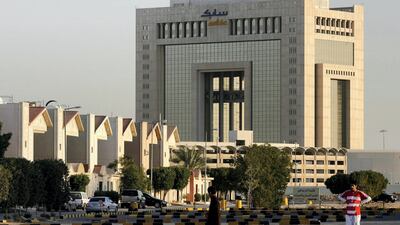Sabic, the Middle East's biggest petrochemicals company, intends to use more clean power at its sites to meet its renewable energy targets.
“Renewable energy is going to play a major part in our operations in the next 10 to 15 years and to make sure this happens, we are looking to partner with independent power producers that will produce renewable energy and provide it to us through the national grid,” said Hassan Raboui, a scientist at the company.
“In return, we will commit to long-term power purchase agreements to ensure bankability and financing of these projects.”
Mr Raboui outlined Sabic’s renewable energy road map and strategy for the next ten years on Tuesday at Mena Energy Meet, an online conference organised by Muscat Expo.
Sabic plans to install 4 gigawatts of renewable energy capacity at its sites around the world by 2025 and increase this to 12 gigawatts by 2030.
Over the next five years, the company intends to cut greenhouse gas emissions and energy intensity by 25 per cent from 2010 levels.
Sabic signed a €70 million ($82m) deal with Spanish utility Iberdrola earlier this year for the construction of a 100-megawatt solar photovoltaic plant at its chemical plant in Cartagena, Spain.
The plant is expected to become the world’s first large-scale chemical production site to be powered entirely by renewable sources once it is operational in 2024.
The company also plans to use photovoltaic technology at its headquarters in Riyadh while a feasibility study with Marafiq and the Royal Commission for Jubail and Yanbu to explore a 400MW solar project worth $300m on Saudi Arabia's western coast is in its final stages.
“The transition to renewable energy is a crucial step to reduce our greenhouse gas emissions and the carbon footprint of our products, Mr Raboui said.
"This step will create monetary value for Sabic and our consumers, as well as ensure that we can meet emerging climate change regulations and consumer demand.”
Sabic has also hastened the development of low carbon-emitting technology for use in chemical production, he said.
Saudi Aramco acquired a 70 per cent stake in the company for $69.1 billion in June.
Sabic last week reported a 47 per cent increase in third-quarter net profit as production increased, sales grew and impairments were reversed.
Net profit for the three months ending September 30 jumped to 1.09bn riyals ($291m).
Meanwhile, Jorgo Chatzimarkakis, secretary general of Hydrogen Europe, told the conference that countries in the EU were investing heavily in green hydrogen projects.
Six countries – Germany, Spain, France, Portugal, Austria and Italy – have earmarked €32bn ($37.4bn) to invest in hydrogen projects over the next ten years, he said.
Hydrogen Europe is a trade association that represents the interests of the hydrogen and fuel cell industry.
A Bank of America Securities report said on Sunday that the development of hydrogen as a source of green fuel could create an industry with infrastructure worth $11 trillion and an annual revenue of $2.5tn by 2050, with the fuel expected to meet 24 per cent of total energy needs.


